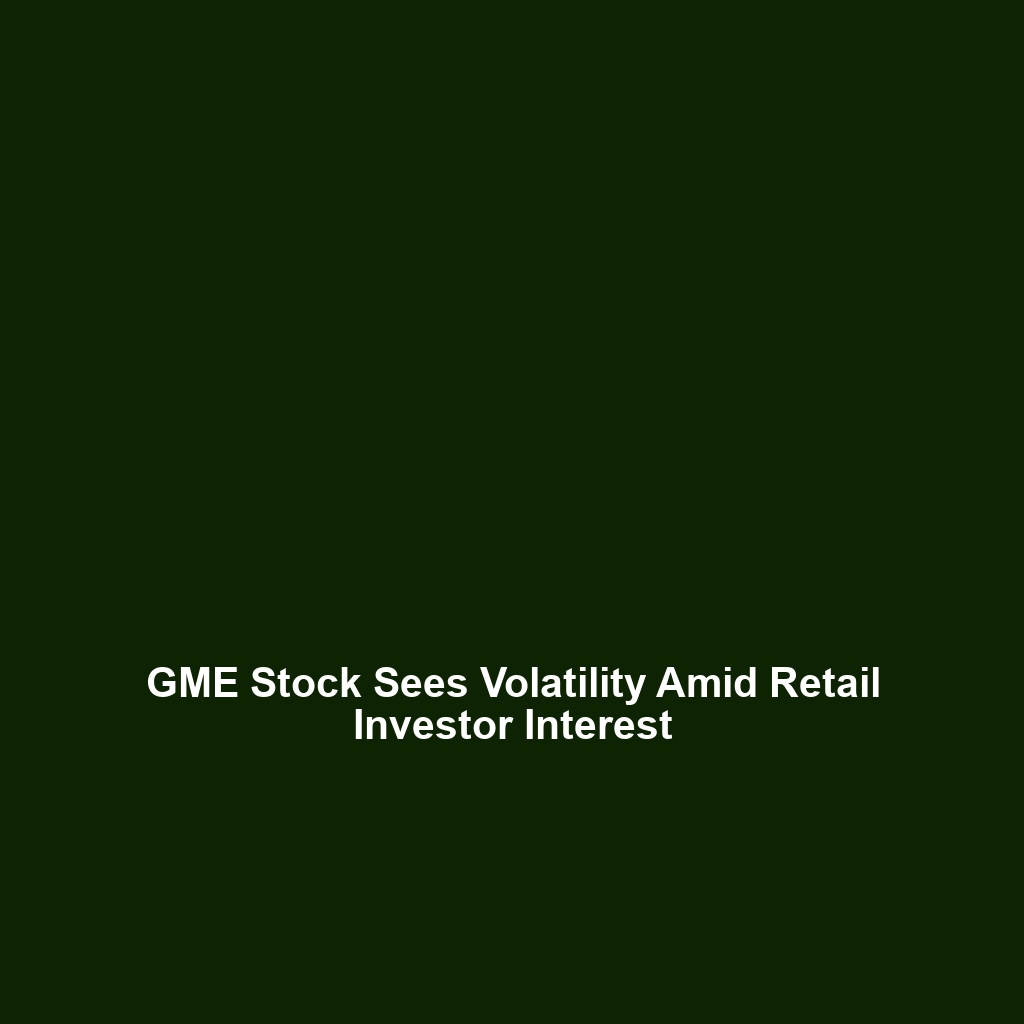Your cart is currently empty!
Tag: retail trading

GME Stock Sees Volatility Amid Retail Investor Interest
GME Stock Sees Volatility Amid Retail Investor Interest
GME Stock Sees Volatility Amid Retail Investor Interest
GameStop Corp.’s stock (GME) has recently witnessed significant price fluctuations as retail investors continue to show strong interest in the gaming retailer. This volatility highlights the ongoing impact of individual investors on market dynamics, particularly in the context of a stock that has garnered substantial attention since the early 2021 meme stock phenomenon.
Recent Market Activity
Over the past few weeks, GME stock has experienced a rollercoaster of price movements, closing at $28.25 on October 5, 2023, after hitting a low of $24.12 just days prior. This surge comes on the heels of renewed enthusiasm from retail investors, who have been actively trading the stock on platforms such as Robinhood and Reddit’s WallStreetBets forum.
According to data from MarketBeat, GME’s trading volume reached an astonishing 14 million shares on several occasions last month, significantly above its average volume of just under 4 million. Such spikes indicate strong retail interest and highlight the potential for rapid price changes as these investors react to market signals and news events.
The Role of Retail Investors
The renewed interest in GME stock aligns with a broader trend where retail investors have reclaimed significant influence in stock markets, particularly in high-profile cases like GameStop. This trend has led to a shift in dynamics, often referred to as the “retail revolution” in trading.
A recent survey from the Financial Industry Regulatory Authority (FINRA) noted that nearly 49% of retail investors reported trading stocks more frequently in 2023 than they did the previous year. This surge in activity has been attributed to several factors, including the increasing prevalence of commission-free trading apps and the accessibility of investing education through social media and online communities.
Market Analyst Insights
“The volatility in GME stock is a testament to how much influence retail investors can wield in this market,” remarked David Keller, Chief Market Strategist at StockCharts.com. “This recent fluctuation can be linked directly to the collective sentiment and trading patterns of individual investors, who often react emotionally to news and social media trends.”
Experts suggest that these price movements may not solely be driven by economic fundamentals but rather by the social dynamics of retail trading communities. Keller emphasized that “there is definitely a speculative element at play, which can result in extreme volatility—especially in stocks that are already quite volatile like GME.”
External Factors Influencing Volatility
Several external factors have contributed to the volatility surrounding GME stock, including forecast reports from industry experts and broader market trends influencing consumer spending in retail. Recent reports indicating a potential slowdown in the gaming market have led some analysts to express caution regarding GME’s long-term prospects.
According to a recent earnings forecast published by MarketWatch, analysts predict that GameStop may only achieve a revenue increase of 5% year-over-year, which could dampen investor enthusiasm and heighten price fluctuations. Furthermore, analysts’ revisions to stock ratings—lowering expectations for growth—have also contributed to the stock’s unpredictable nature.
The Future of GME Stock
Looking ahead, the future of GME stock may hinge on multiple factors, including retail investor sentiment, company performance, and broader market conditions. While enthusiasm remains high among certain segments of retail investors, analysts caution that ongoing fluctuations and speculative trading could lead to increased risk for those investing in GME.
“Investors need to be cautious,” warns Laura Martin, a senior analyst at Needham & Company. “While there may be potential for short-term gains, the longer-term picture remains uncertain amid economic challenges and changing consumer behavior on gaming platforms.”
Conclusion
In summary, GameStop’s GME stock has become a focal point for retail traders, characterized by significant price volatility driven by renewed interest from individual investors. As market conditions evolve and external influences come into play, the future trajectory of GME will likely continue to reflect the passions and responses of its retail investor base.
Investors are advised to stay informed and exercise caution when engaging with stocks characterized by such volatility, as the landscape remains fluid and susceptible to rapid changes.
